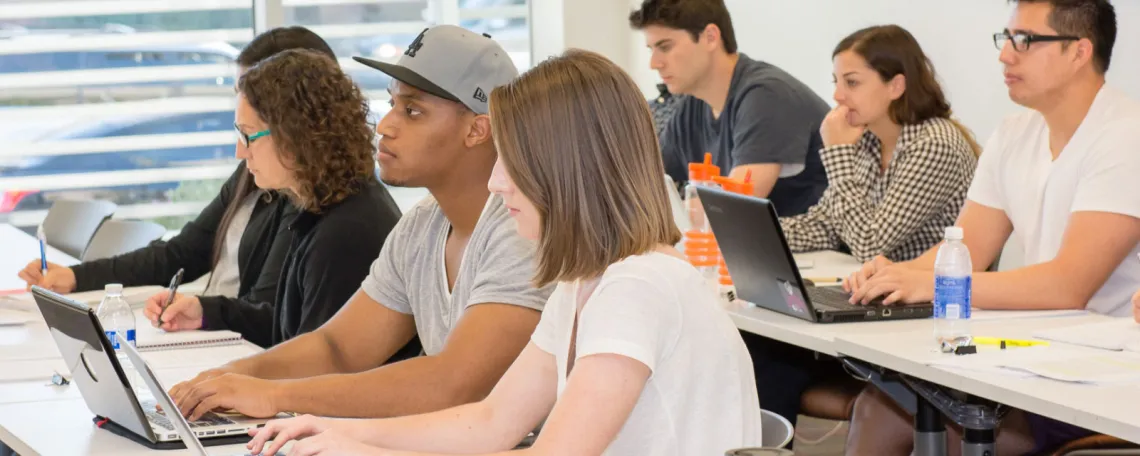
ACADEMICS & STUDENT RESOURCES
Succeeding as a law student means “completion of law school in a healthy fashion, with oneself intact.”
— University of Arizona Law Assistant Dean of Student Affairs Willie Jordan-Curtis
Get the academic and community support you need to thrive before, during and after law school.
As you plan for the road ahead, know that University of Arizona Law has a support system built to help you succeed — in the classroom and beyond. Explore this section to make sure you’re in the know about all the resources and opportunities available to you as an Arizona Law student and how to create an individualized educational experience that suits your specific needs and goals.
STUDENT ORGANIZATIONS
The time you spend at University of Arizona Law should be immersive and multidimensional. Enrich your education and deepen your community by joining one of our many student organizations.
STUDENT RESOURCES
Everything you need to succeed. Review course schedules, the student handbook, bar exam information, library resources, wellness info and more.
A Brief List:
The College of Law is committed to equal educational opportunities for students with disabilities. The Disability Resource Center (“DRC”) at the University of Arizona is the office designated by the university to receive requests for reasonable accommodations. A student who, because of disability, seeks a reasonable accommodation for, among other things, attendance, class preparation, or class participation, or who anticipates barriers related to the format or requirements of the course, must provide documentation of the disability to the DRC and meet with a DRC Access Consultant to discuss accommodations. If the DRC determines that a disability-related accommodation is necessary, this will be communicated to the Assistant Dean of Student Affairs, who will make the necessary arrangements with all affected faculty. Students who have temporary disabilities, illnesses, or other emergencies that require some accommodation in order to meet class requirements should consult with the Assistant Dean of Student Affairs, who will determine what, if any, accommodation is necessary. The Assistant Dean of Student Affairs will make the necessary arrangements with all affected faculty.
Students may contact the Disability Resource Center via email or at 520-621-3268.
The College of Law offers academic support group tutoring in all substantive first-year courses. The group tutorials are offered free of cost to all first-year students. Tutors are second- and third-year students who did well in the class in prior year(s) and who are recommended by the professor teaching the class.
Individual tutoring is offered on an as-needed basis. The cost for individual tutoring is jointly covered by the College of Law and the student being individually tutored. Any questions concerning individual or group tutoring should be addressed to Assistant Dean for Student Affairs Willie Jordan-Curtis via email or at 520-621-8602.
The Arizona Law Writing Center, supervised by the Legal Writing Department, provides free writing-support services and resources to students in all University of Arizona Law degree programs.
Make an appointment and view other Law Writing Center Resources.
The University of Arizona’s Counseling and Psychological Services (CAPS) office offers psychological counseling to students to help them cope with personal problems so that they can successfully achieve their educational goals.
Licensed professionals provide brief treatment for anxiety, depression, difficulties with relationships, family problems, food/body image concerns, alcohol and drug (ADD) concerns, life crises and other issues.
Campus and Community Resources
- Counseling and Psychological Services, 520-621-3334
- Campus Health Services, 520-621-6490 or (after hours) 520-570-7898
- Residence hall director, dean, academic advisor, tutor, or faculty
- Campus religious or spiritual leader
- Community mental health and support centers, including:
- Emerge Center Against Domestic Abuse, 888-428-0101 (toll-free hotline)
- La Frontera, 520-838-3804
- Local crisis center or hotlines
If you are concerned that you or someone you know may be at risk for suicide, we strongly encourage you to do one or more of the following:
- Contact UA Counseling and Psychological Services
- Contact a mental health provider within Tucson such as:
- National Alliance on Mental Health Southern Arizona Community-Wide Crisis Line, 520-622-6000 or 866-495-6735
- Crisis Response Center 24/7 walk-ins, 2802 E. District St.
- Warm Line, Peer Recovery Non-Emergency Support, 520-770-9909
- Call 1-800-273-8255(TALK), the National Suicide Prevention Lifeline, for a referral
- Call the campus emergency number: 520-621-UAPD(8273)
- Call 911
Other resources for information about suicide include:
- National Suicide Prevention Lifeline, 800-273-8255(TALK)
- American Association of Suicidology, 202-237-2280 (for people touched by suicide)
- American Foundation for Suicide Prevention, 888-333-2377
